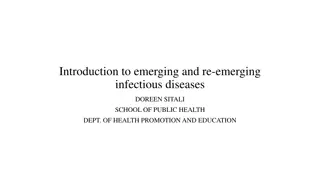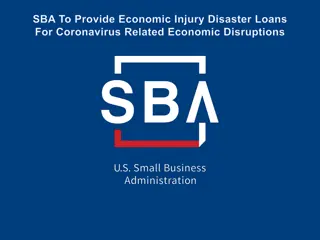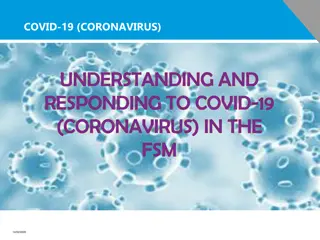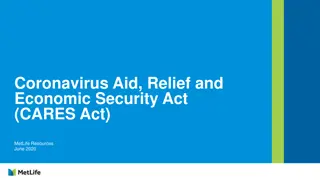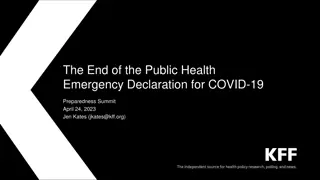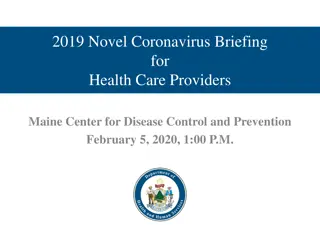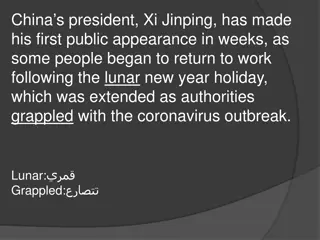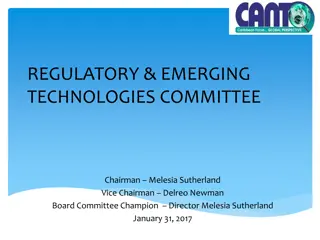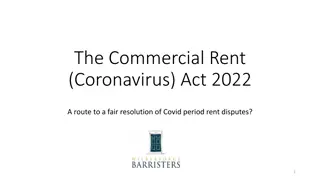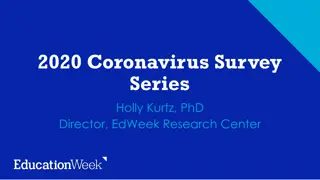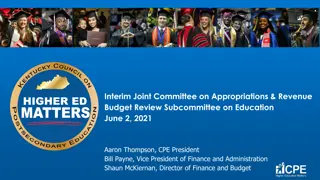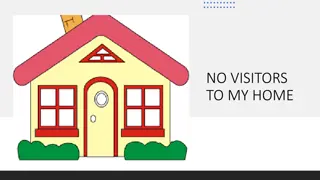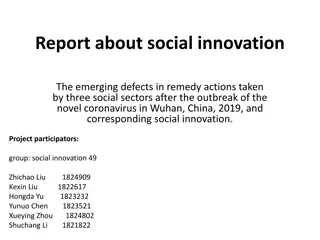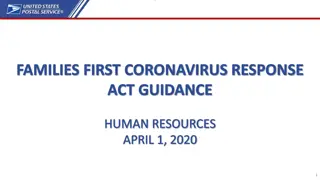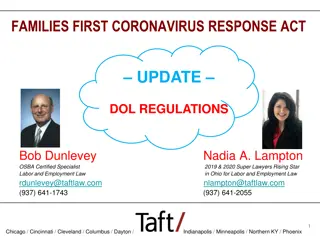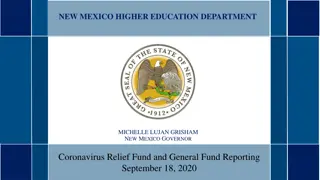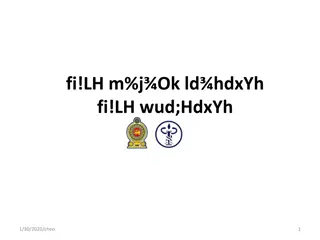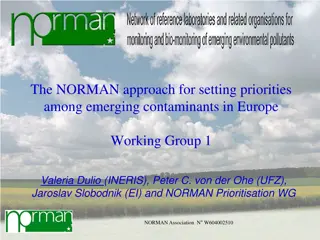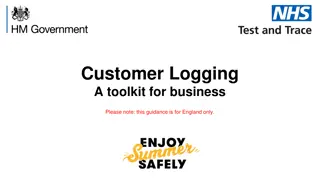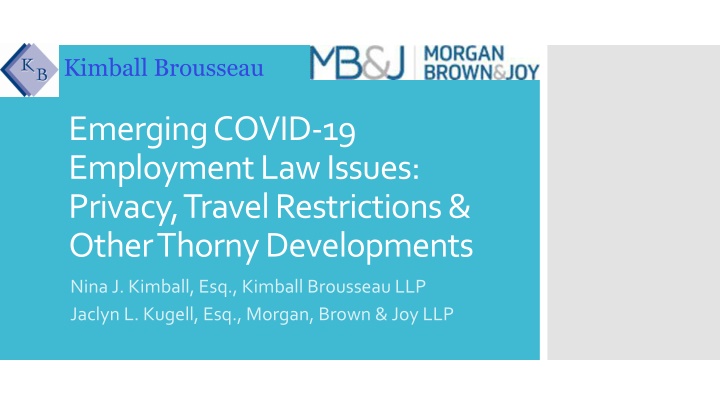
Massachusetts Travel Restrictions in Response to COVID-19
Learn about the Massachusetts travel restrictions effective from August 1, 2020, requiring quarantine or a negative COVID-19 test for all arrivals. Explore exceptions, employer guidelines, and the Travel Form process.
Download Presentation

Please find below an Image/Link to download the presentation.
The content on the website is provided AS IS for your information and personal use only. It may not be sold, licensed, or shared on other websites without obtaining consent from the author. If you encounter any issues during the download, it is possible that the publisher has removed the file from their server.
You are allowed to download the files provided on this website for personal or commercial use, subject to the condition that they are used lawfully. All files are the property of their respective owners.
The content on the website is provided AS IS for your information and personal use only. It may not be sold, licensed, or shared on other websites without obtaining consent from the author.
E N D
Presentation Transcript
Kimball Brousseau Emerging COVID-19 Employment Law Issues: Privacy, Travel Restrictions & Other Thorny Developments Nina J. Kimball, Esq., Kimball Brousseau LLP Jaclyn L. Kugell, Esq., Morgan, Brown & Joy LLP
Effective August 1, 2020, all persons arriving in Massachusetts must quarantine for 14 days unless (a) the person is coming from a State designated as a lower-risk and, aside from transitory travel, has not been present in any State or jurisdiction not designated as a lower-risk during the last 14 days; or (b) the person has received a negative test result for COVID-19 from a test performed on a sample taken not longer than 72 hours before the person's arrival in Massachusetts and can produce proof of the negative test result on request;. or (c) the person falls within one of the limited, circumstance-specific exceptions. MA Travel Restrictions; Executive Order
A person who tests in MA after being in a higher risk State or jurisdiction, can stop quarantining once they can produce evidence of a negative test. The order applies to residents and non-residents of MA MA Travel Restrictions; Executive Order MA residents are urged to limit out-of-state travel only to lower risk States. Employers are strongly discouraged from requiring or allowing business related travel other than to lower risk States. However, if it occurs employers should take measures to ensure employees comply with the order. Employers should strongly discourage their employees form taking personal travel to destinations other than lower risk States.
Anyone who must quarantine or produce a negative test pursuant to the order, must fill out and submit a Travel Form. The Travel Form is available on MA DPH s website, along with instructions on how to submit it. Information on the Travel Form includes the location at which the individual plans to quarantine such that MA DPH may contact the individual to ensure compliance with the order. An individual required to quarantine can leave MA prior to the expiration of the 14-day quarantine period. MA Travel Restrictions; Travel Form/ Self- Certification
The Order does not apply to people arriving in MA when: (a) they are in transit, i.e., they are passing through MA in transit to another place (but only as long as reasonably required to travel through MA to make bus/plane connections, stop at a highway rest stop, etc.) (b) they are regularly commuting (at least weekly) for work or school (exception only extends to travel between home and place of work/school). (c) they are receiving medical treatment (and persons accompanying them). (d) they are military personnel traveling at the order or directive of a Federal or State military authority. (e) they are performing critical infrastructure service (per the Critical Infrastructure Workers listing published by the Federal Cybersecurity and Infrastructure Security Agency dated 5/19/20). Exception only applies when the person is actively engaged in performing work and at all other times the individual must comply with the Order. MA Travel Restrictions; Executive Order - Exceptions
Penalty for Violating the order includes: Civil fine of up to $500 per violation (each day of failure to quarantine when required may be treated as a separate violation and may result in a separate $500 civil fine). MA Travel Restrictions; Executive Order - Penalty All Workplace Safety Rules are amended to include a provision that directs employers to take measure to ensure employees comply with all State-issued rules concerning out-of-state travel for any employer paid or reimbursed travel .
Employees who are unable to work because they are subject to a federal, state or local COVID-19 quarantine or isolation order are eligible for 2 weeks (up to 80 hours) of Emergency Paid Sick Leave (EPSL) under the FFCRA. MA Travel Restrictions; Executive Order and the Families First Coronavirus Response Act (FFCRA) Applies to employee who cannot work or telework due to a quarantine order. The FFCRA only applies to employers with 500 or fewer employees. Employees are only entitled to EPSL one time prior to 12/31/20. Once an employee has exhausted their leave entitlement, it does not regenerate.
EEOC Guidance COVID 19 viral testing may be required because, in the context of the current pandemic, employees with COVID-19 pose a direct threat of harm to the health of others. Such testing is therefore job related and consistent with business necessity. Testing does not obviate the need to require/implement all other workplace safety practices. The EEOC has not yet authorized antibody testing of employees under any circumstances. Observe ADA confidentiality obligations.. Employer Required/ Conducted COVID-19 Testing Adhere to return to work DPH guidelines for anyone who tests positive. WHO PAYS FOR IT??? CAN AN EMPLOYER REQUIRE A TEST TO RETURN TO WORK? OR NOT?
Mandatory Workplace Safety Standards Screening Obligations and Directing Employees Not to Come to Work if Ill. Materials found on mass.gov/reopening Sector Circular Mandatory Safety Standards and recommended best practices in social distancing, hygiene protocols, staffing/operations, and cleaning/disinfecting for each sector. Sector Checklist Requirement throughout that employees directed not come to work iif they are ill. Employee self-screening prior to work, including temperature and symptom checks, and employer screens/employee certification of no symptoms, temperature or exposure to some who has tested positive for COVID-19.
EMPLOYEES SHOULD NOT REPORT TO WORK WHO HAVE COVID- 19 SYMPTOMS CDC HAS REVISED ITS GUIDANCE FOR WHEN TO END HOME ISOLATION IF A PERSON HAS BEEN EXPOSED, OR HAS CONTRACTED COVID-19 CDC Revises Guidance for When Employees Can Return to Work Safely 1. To expand its list of symptoms 2. To shorten time since last fever from 72 to 24 hours CDC recommends a Symptom-based strategy for ending home isolation; not a Test-based strategy (except in certain circumstances). The Symptom-based strategy considers when to end home isolation based on the amount of time since symptoms onset, and whether symptoms have improved. Testing to end home isolation requires two consecutive negative tests 24 hours apart, and can be used to end isolation earlier than Symptom-based strategy.
EMPLOYERS SHOULD UPDATE COVID-19 CONTROL PLAN FOR EXPANDED LIST OF SYMPTOMS CDC has expanded its list of symptoms of COVID-19: fever or chills cough shortness of breath or difficulty breathing fatigue muscle or body ache headache new loss of taste or smell sore throat congestion or runny nose nausea or vomiting diarrhea CDC Expanded List of COVID- 19 Sypmtoms Symptoms may appear 2-14 days after exposure to the virus.
EMPLOYERS SHOULD UPDATE COVID-19 CONTROL PLAN FOR SHORTER PERIOD SINCE LAST FEVER For persons who have COVID-19 symptoms: CDC Symptom- based Strategy for Ending Home Isolation Symptom-based criteria for ending home isolation: At least 10 days have passed since onset of symptoms AND At least 24 hours (instead of 72 hours) have passed since lastfever without the use of fever-reducing medications, AND Other symptoms have improved (instead of respiratory symptoms to address expanding list of symptoms). For patients with severe illness, duration of isolation for up to 20 days after symptom onset may be warranted.
For persons infected but who never develop symptoms: isolation and other precautions can end 10 days after the date of their first positive test. Persons Who Never Develop Symptoms For persons exposed but who never develop symptoms: CDC recommends 14 days of home isolation because symptoms can develop in 2-14 days This means that persons who are infected can potentially end isolation earlier (10 days from onset of symptoms) than someone who is exposed but never develops symptoms.
CAN AN EMPLOYER REQUIRE AN EMPLOYEE ENDING HOME ISOLATION TO BE TESTED BEFORE RETURNING TO WORK? Can Employer Require Test to Return to Work? While the EEOC allows testing, even though it is a medical examination, given the pandemic The CDC recommends a symptom-based strategy for determining when to end home isolation Therefore an employee could have a right to return to work if the CDC Symptom-based test is satisfied.
EMPLOYERS FACING ISSUES OF EMPLOYEES BEING FEARFUL OR UNABLE TO RETURN TO WORK FEARFUL: DUE TO HEALTH CONDITION: Employees who have a medical condition may have protection under ADA to get reasonable accommodation to a medical condition that is a disability Employees fearful of returning to work due to a serious health condition may be able to have FMLA leave for up to 12 weeks in a 12-month period Both would require medical documentation Employer cannot retaliate against employee for requesting protected leave under ADA, FMLA. Employees Unable or Fearful of Returning to Work UNABLE: LACK OF CHILDCARE: Some employees who lack childcare may not be able to return to workplace with childcare providers, schools and summer camps closed.
MANY STATUTES PROVIDE RIGHTS TO ACCOMMODATIONS INCLUDING LEAVES OF ABSENCE Families First Coronavirus Relief Act (FFCRA) extends through 12- 31-20 Employees may use FFCRA paid sick and family leave for COVID- 19 related reasons through 12-31-20 up to the caps ADA leave as reasonable accommodation for employee with medical condition preventing work due to COVID-19 FMLA allows leave for serious health condition up to 12 weeks Mass. Paid Sick Leave law up to 40 hours a year Pregnant Workers Fairness Act accommodations Small Necessities Leave Act medical appointments Disparate Impact Analysis including for family care responsibilities Accommoda- tions and Leave Obligations Under Various Laws
FFCRA Leave Applies to employers with fewer than 500 employers and covered public sector employers; Employees eligible after 30 days of employment Family Medical Emergency Leave Act (FMELA); Expands the Family and Medical Leave Act to provide up to 12-weeks of job protected leave to an employee who is unable to work (or telework) due to a need for leave to care for their child because of school/child care closures, or child care unavailability due to COVID-19 related reasons. School Closures and the FFCRA Emergency Paid Sick Leave Act (EPSLA) provides for 2 weeks (up to 80 hours) of sick time for a variety of reasons, including an employee s inability to work (or telework) due to their child s school closure/child care unavailability (same reason as FMLEA leave). Employee entitled to a total of 12-weeks of job protected leave due to school closure under the FFCRA (combination of FMLEA and EPSLA will only provide employee 12-weeks of leave). FFCRA leave is paid up to $200/day. Employer may receive a payroll tax credit as reimbursement for payment to employee.
WHEN WOULD AN EMPLOYER BE REQUIRED TO ALLOW AN EMPLOYEE TO CONTINUE WORKING FROM HOME? HEALTH CONDITION: UNDER ADA AND 151B AN EMPLOYEE WITH A DOCUMENTED HEALTH CONDTION THAT CAUSES EMPLOYEE TO BE AT GREATER RISK OF CONTRACTING COVID-19, AND GREATER RISK TO HEALTH WHOSE DOCTOR ADVISES REMOTE WORK IF THE JOB IS CAPABLE OF BEING DONE REMOTELY When Does Employer Have to Allow Remote Work MUST EMPLOYER TRANSFER OR RESTRUCTURE THE JOB TO ACCOMMODATIE A HEALTH CONDITION? IF THERE IS A JOB AVAILABLE TO TRANSFER INTO NEED NOT CREATE A NEW OR NEW PART-TIME JOB
WHEN WOULD AN EMPLOYER BE REQUIRED TO ALLOW AN EMPLOYEE TO CONTINUE WORKING FROM HOME? When Does Employer Have to Allow Remote Work : Childcare and Family Care CHILDCARE/FAMILY CARE: UNDER CHAPTER 151B IF AN EMPLOYEE IS CAPABLE OF DOING JOB REMOTELY A POLICY THAT REQUIRES EMPLOYEES TO WORK ON SITE COULD HAVE A DISPARATE IMPACT ON WOMEN BECAUSE DATA SHOWS WOMEN PROVIDE MORE CHILD AND ELDER CARE
EEOC Guidelines on Discrimination Against Workers with Caregiving Responsibilities The EEOC has issued guidelines for preventing discrimination against employees based on their caregiving responsibilities Care Giver Leave/EEOC Guidelines EEOC: Discrimination against a worker with caregiving responsibilities constitutes unlawful disparate treatment under Title VII or the ADA there are circumstances in which discrimination against caregivers might constitute unlawful disparate treatment For example, if an employee is allowed to work remotely due to a health condition, but an employee who needs to work from home due to childcare is denied, that could be discrimination based on child care responsibilities
LACK OF CHILDCARE AND ADVERSE IMPACT A policy that required all employees to work on site Discrimination Based on Child care Responsibilities Even though an employee s job could be done remotely Could have an adverse impact on women, or on those with childcare responsibilities If female employees are the ones who need to stay home to care for children due to lack of child care or school closures
Pregnant Workers Fairness Act Employers must accommodate pregnant workers who need accommodation for COVID-19 reasons. Accommoda- tions: Pregnant Workers Pregnant worker may be more at risk to infection with adverse consequences. Accommodations could include: modified work schedule transfer to a less risky area of workplace more PPE or protective measures teleworking leave which could qualify under FMLA, ADA or 151B
NINA JOAN KIMBALL THANK YOU nkimball@kbattorneys.com
JACLYN L. Kugell THANK YOU jkugell@morganbrown.com

